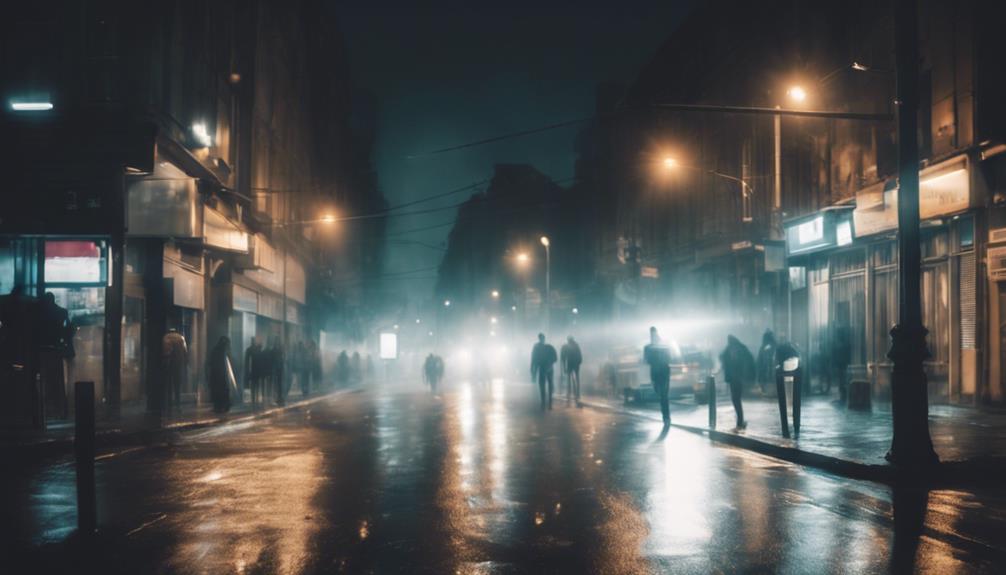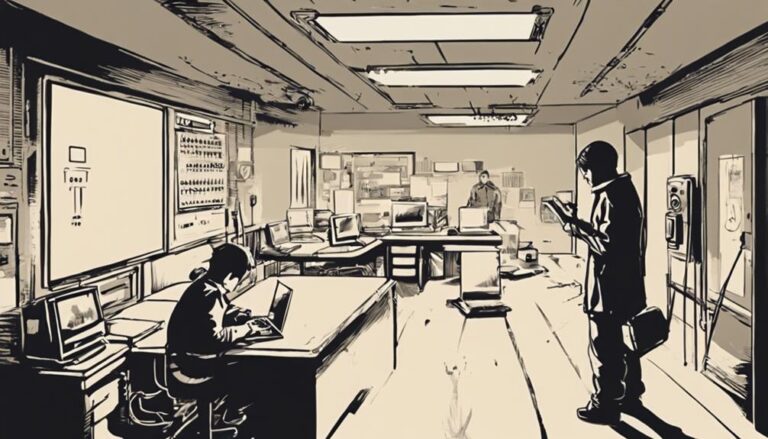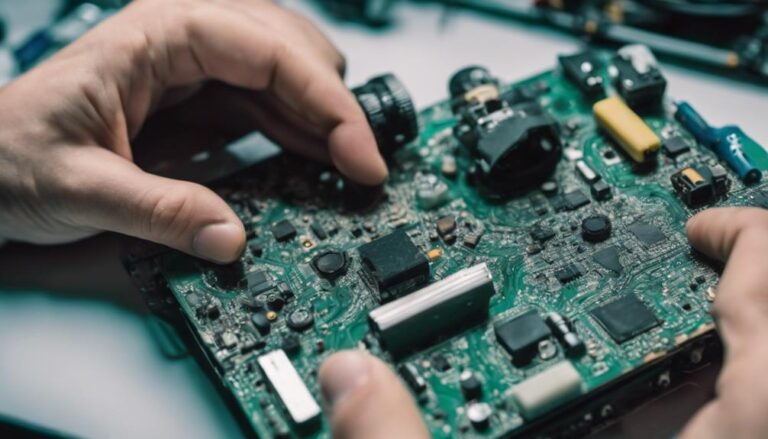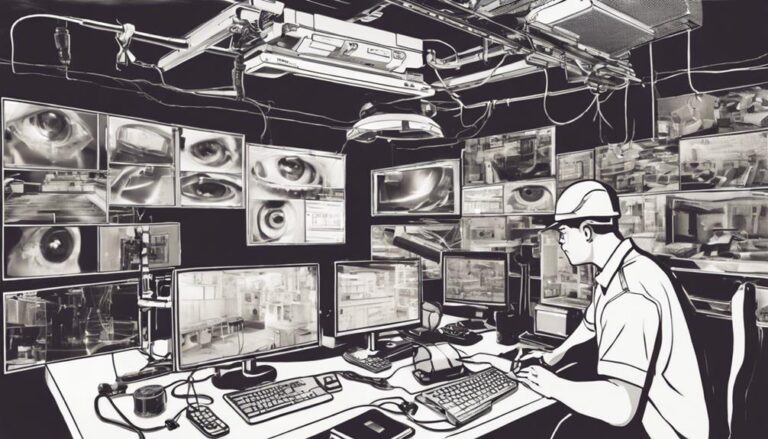If your CCTV camera footage is blurry at night, it could be due to several factors. First, check for improper focus adjustments that can create hazy images. Inadequate lighting severely impacts clarity, so make sure your environment is well-lit. Lens contamination from dirt or moisture can also distort your footage. Regular lens maintenance and cleaning are essential for peak performance. Consider upgrading to high-quality cameras with infrared technology, enhancing low-light capabilities. By verifying these elements, you can improve your nighttime surveillance considerably. You’ll discover additional tips for maintaining and fine-tuning your system effectively.
Common Causes of Blurriness

When it comes to CCTV cameras, several common causes can lead to blurriness, especially at night. One primary issue is improper focus adjustment. If your camera‘s focus isn’t set correctly, the footage can appear hazy, making it difficult to discern important details. Make sure that you’re using the appropriate settings for the environment, as automatic focus may not always provide the best results in low-light conditions.
Another factor to take into account is image stabilization. Many CCTV cameras come equipped with this feature to minimize the effects of vibrations or movement. If your camera lacks effective stabilization, even slight movements can introduce blurriness, particularly noticeable at night when the light is scarce. You might want to explore models that include advanced stabilization technology to enhance clarity.
Additionally, dirt or moisture on the lens can also contribute to image distortion. Regularly cleaning your camera’s lens is essential to maintain clear visuals. Finally, environmental factors such as wind or passing vehicles can shift the camera’s position, further complicating focus and stabilization. Addressing these common causes can greatly improve your CCTV footage’s clarity during nighttime monitoring.
Importance of Proper Lighting
Proper lighting is essential for enhancing nighttime visibility in CCTV footage. The type of lighting you choose can greatly impact the quality of the images captured, affecting clarity and detail. By understanding the relationship between lighting and camera performance, you can optimize your surveillance system for better results.
Nighttime Visibility Enhancement
At night, the effectiveness of CCTV cameras hinges greatly on adequate lighting. When there’s insufficient illumination, your camera’s ability to capture clear images diminishes greatly, impacting overall security. Night vision capabilities are designed to function effectively in low-light conditions, yet they still require some level of ambient light to enhance image clarity. If your environment is too dark, even the best night vision technology won’t deliver satisfactory results.
Proper lighting not only improves the visibility of your surveillance footage but also aids in the identification of individuals and objects. By strategically placing lights in important areas, you can guarantee that your CCTV cameras can pick up essential details. This is especially important when monitoring entrances, parking lots, or other vulnerable locations.
Additionally, consider the color temperature of your lighting. Warm light can enhance image quality, making it easier for cameras to distinguish between shades and details. Ultimately, investing time in improving your nighttime lighting will lead to sharper images and a more effective surveillance system, giving you the freedom to feel secure in your environment.
Lighting Types Impact Quality
Lighting types play an important role in the quality of surveillance footage captured by CCTV cameras. When you’re setting up your system, it’s vital to take into account the color temperature of the lights you use. Different color temperatures can affect how well your camera captures details at night. For instance, warmer lights (around 2700K) may create a softer image but can wash out colors, while cooler lights (around 5000K) provide clearer, more defined images and can enhance contrast.
Ambient light is another key factor. In poorly lit environments, CCTV cameras struggle to capture clear footage, resulting in blurred images. To mitigate this issue, you should make sure there’s sufficient ambient light in the monitored area. Adding supplemental lighting, such as LED floodlights, can greatly improve visibility.
Additionally, you should avoid direct light shining into the camera lens, as this can cause glare and further degrade image quality. By optimizing your lighting setup, you can greatly enhance the clarity of your CCTV footage, making sure you capture every vital detail for your security needs.
Lens Quality and Its Impact
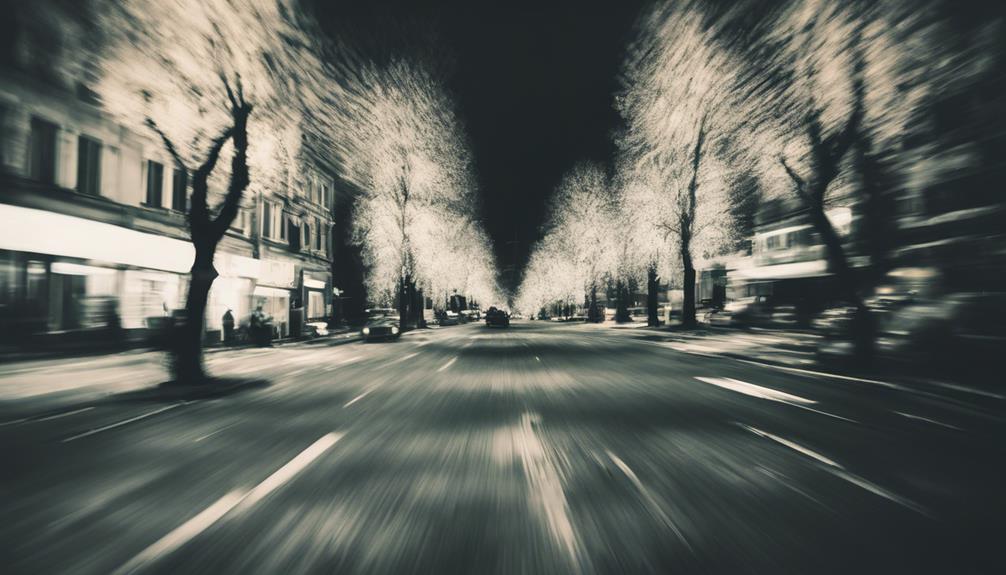
Choosing the right lens quality is crucial for ensuring clear night-time surveillance. High-quality lenses can greatly enhance your CCTV system’s performance, especially in low-light conditions. You’ll want to focus on optical clarity, as this directly affects the image quality captured by your camera. Poor lens quality can lead to blurred images, making it difficult to identify subjects.
One critical aspect of lens quality is the type of lens coatings used. Anti-reflective coatings help reduce glare and improve light transmission, allowing more light to reach the sensor. This is particularly important at night when light sources are minimal. Lenses with superior coatings can minimize distortion and enhance overall image sharpness, offering you a clearer view of your surroundings.
Furthermore, consider the focal length and aperture size of the lens. A larger aperture allows more light to enter, helping to capture clearer images in darkness. Investing in lenses with high optical clarity and effective coatings will ultimately improve your surveillance capabilities, providing you with the freedom to monitor your property effectively, even when the sun goes down.
Adjusting Camera Settings
While lens quality lays the foundation for clear night-time surveillance, properly adjusting your camera settings can greatly enhance the overall performance of your CCTV system. Start by ensuring your camera resolution is set to the highest possible level; this will allow for the most detailed images, especially in low-light conditions. Next, pay attention to the focus settings. An out-of-focus camera can lead to blurry images, so take the time to adjust these settings until you achieve sharpness.
Here’s a simple guide to help you adjust your camera settings effectively:
| Setting | Recommended Value |
|---|---|
| Camera Resolution | 1080p or higher |
| Focus Mode | Manual for precision |
| Exposure Time | 1/30 sec or longer |
| Brightness Level | Adjust based on environment |
The Role of Infrared Technology

Utilizing infrared technology is essential for improving nighttime visibility in CCTV systems. By incorporating infrared illumination, you can enhance your camera’s ability to capture clear images in low-light conditions. This technology works by emitting infrared light, which is invisible to the human eye but can be detected by specialized cameras equipped with infrared sensors.
When selecting a CCTV system, pay attention to the thermal sensitivity of the cameras. Higher thermal sensitivity enables better differentiation between objects in various temperature ranges, ensuring that you can identify potential threats or movements even in complete darkness. This is particularly useful for outdoor surveillance, where ambient light conditions often fluctuate.
Moreover, infrared technology reduces the reliance on external lighting, which can draw unwanted attention or increase energy costs. Instead, your CCTV system can operate discreetly, maintaining a low profile while providing reliable surveillance.
Cleaning Your Camera Lens
To guarantee peak performance of your CCTV camera, regular cleaning of the lens is essential. Using the right materials and techniques can prevent dust and smudges from compromising image quality. In the following sections, we’ll outline the importance of cleaning, recommend suitable cleaning supplies, and provide a step-by-step guide to effectively clean your camera lens.
Importance of Regular Cleaning
A clean camera lens is vital for maintaining ideal image quality, especially during nighttime surveillance. Over time, dust, dirt, and moisture can accumulate on the lens surface, degrading your CCTV footage. Regular cleaning guarantees that you’re not compromising your investment in surveillance technology.
Environmental factors play a significant role in the clarity of your images. Outdoor cameras are particularly susceptible to elements like rain, pollen, and pollution, all of which can obstruct your view. If you want peak performance, it’s essential to address these contaminants promptly.
Additionally, lens protection should be a priority. A protective cover can shield your lens from harsh weather conditions and physical damage, but it won’t eliminate the need for routine maintenance. Even with protection, regular cleaning minimizes the risk of scratches and long-term wear that could affect image quality.
Recommended Cleaning Materials
When it comes to cleaning your camera lens, having the right materials is essential for avoiding damage and ensuring peak performance. Start with high-quality cleaning solutions specifically designed for optical surfaces. These solutions are formulated to effectively remove dirt, dust, and smudges without causing harm to the lens coating.
Next, consider using lens wipes. These pre-moistened, lint-free wipes are convenient and safe for cleaning. They’re designed to lift away grime without scratching the surface, ensuring your lens remains clear and functional. It’s vital to avoid using paper towels or household cleaners, as these can contain abrasive materials that might damage the lens.
If you prefer a more sustainable approach, a microfiber cloth is another excellent option. Make sure it’s clean and dry before wiping the lens, as this helps prevent any particles from scratching the glass. Additionally, keep a spray bottle of lens cleaning solution handy for more stubborn stains.
Step-by-Step Cleaning Guide
Cleaning your camera lens is essential for maintaining ideal image quality, especially in low-light conditions. A clean lens guarantees that your CCTV captures clear, sharp images, critical for effective surveillance. Follow these step-by-step cleaning techniques to keep your lens in top condition.
First, gather your materials: a microfiber cloth, lens cleaning solution, and a soft brush. Start by using the brush to remove any loose dust or debris from the lens surface. This step helps prevent scratches during the cleaning process.
Next, apply a few drops of lens cleaning solution to the microfiber cloth—never directly on the lens. Gently wipe the lens in a circular motion, applying light pressure to avoid damaging the lens coating. Confirm you cover the entire surface, including the edges.
After cleaning, inspect the lens for streaks or smudges. If necessary, repeat the process until the lens is clear.
Upgrading Your Equipment

Upgrading your equipment is essential for enhancing nighttime CCTV performance. If you’re dealing with blurry footage, it might be time to reflect on camera upgrades. Investing in high-quality cameras with better low-light capabilities can greatly improve the clarity of your images. Additionally, look for cameras equipped with infrared technology or enhanced sensors that are designed for ideal night vision.
Here’s a quick comparison table to help you evaluate your options:
| Camera Type | Low-Light Capability | Price Range |
|---|---|---|
| Standard Camera | Poor | $50 – $150 |
| Infrared Camera | Good | $150 – $300 |
| Low-Light Camera | Excellent | $300 – $600 |
When making an equipment investment, reflect on not only the initial cost but also the long-term benefits. Better equipment can lead to reduced maintenance and improved security outcomes. In the end, the right upgrades allow you to capture clear, actionable footage, giving you the freedom to monitor your property effectively, even in darkness. Don’t compromise on safety; prioritize your camera performance with thoughtful upgrades.
Regular Maintenance Tips
Consistent maintenance is key to guaranteeing your CCTV system operates at peak performance, especially during nighttime monitoring. Start by checking the camera positioning regularly. Confirm your cameras are aimed correctly and cover the desired areas without obstructions. Misaligned cameras can result in blurry footage, particularly in low-light conditions.
Next, inspect the lenses for dirt, dust, or moisture buildup. Even a small amount of debris can distort the image quality considerably, especially at night. Use a soft, lint-free cloth and a suitable cleaning solution to maintain clarity.
Pay attention to the weather conditions as well. If your cameras are exposed to rain, snow, or extreme temperatures, consider weatherproof housing or protective covers. This not only safeguards your equipment but also maintains ideal functionality.
Frequently Asked Questions
Can Weather Conditions Affect CCTV Camera Clarity at Night?
You might think it’s just low light, but weather interference can greatly impact nighttime visibility. Rain, fog, or snow can blur images, making it essential to take into account weather conditions when evaluating camera performance after dark.
How Often Should I Check My CCTV Camera Settings?
You should check your CCTV camera settings regularly, ideally monthly. This guarantees peak performance and necessary adjustments. Regular CCTV maintenance keeps your system effective, allowing you to enjoy the freedom of reliable surveillance at all times.
What Is the Ideal Distance for Night Surveillance?
When considering nighttime visibility, it’s essential to maintain an ideal distance, typically around 30-50 feet. This range guarantees your optimal lens captures clear images, providing you with the freedom to monitor effectively without compromise.
Can Motion Blur Occur in Nighttime Footage?
Yes, motion blur can occur in nighttime footage, especially under low light conditions. If your camera’s motion detection isn’t optimized, fast-moving objects might appear distorted, compromising the clarity and effectiveness of your surveillance.
Does Camera Resolution Impact Nighttime Image Quality?
You’ll find that camera resolution greatly influences nighttime image quality. Higher resolutions enhance low light performance, allowing better image processing. This clarity guarantees you capture those elusive details that could otherwise slip away unnoticed.
